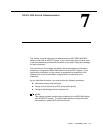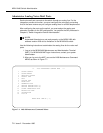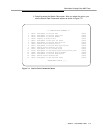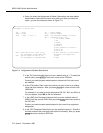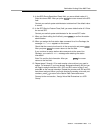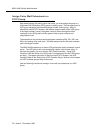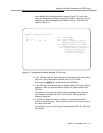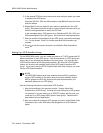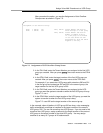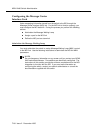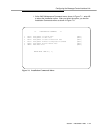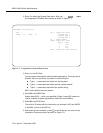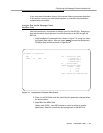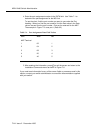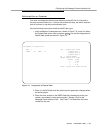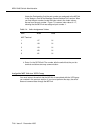
Issue 2 December 1995 7-9
Assign Voice Mail Extensions to a UCD Group
After you select the option, you see the Assignment of Ucd Overflow
Group screen as shown in Figure 7-5.
Figure 7-5. Assignment of UCD Overflow Group Screen
3. In the TN-A field, enter the Tenant Number you assigned to the first UCD
group you created. After you press , the cursor moves to the STN-A
field.
4. In the STN-A field, enter the target number of the first UCD group you
created. After you press , the cursor moves to the TN-B field.
For example, if you create two UCD groups with extensions 500 and 501
in the first group and extensions 502 and 503 in the second group, the
target number for the first UCD group is 500.
5. In the TN-B field, enter the Tenant Number you assigned to the UCD
group you want the system to transfer to when the first UCD group is busy.
Figure 7-5. use 1.
6. In the STN-B field, enter the target number of the UCD group you want the
system to transfer to when the first UCD group is busy.
Figure 7-5. uses 502 as the target number of the second group.
In the example, when all stations in UCD group 500 are busy, voice messaging
traffic automatically
overflows
or transfers to the target number of the second
UCD group, 502. You can link more than two UCD groups. If you do need to link
more than two UCD group, assign overflow for the target number of the second
UCD group to the target number of the third UCD group. You may assign
overflow to as many as 7 groups of 20 stations each.
Assignment of UCD Overflow Group
TN-A: 1 STN-A: 500 TN-A, STN-A: Tenant Number and Station
TN-B: 1 STN-B: 502 which belongs to a UCD group
TN-B, STN-B: Tenant Number and Station
Number of member station
in a UCD group to be hunted
in the case where the UCD
designated by TN-A and STN-A
happens to be busy.
ENTER
ENTER



